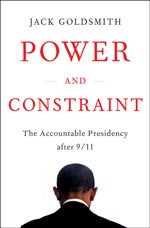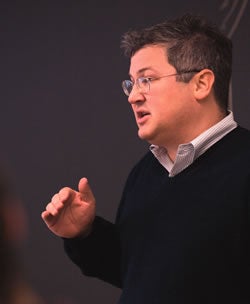
The presidency is more powerful, larger, and has more tools at its disposal than ever before, said Professor Jack Goldsmith. But, he quickly added, that’s only half the story.
The other half of the story—the forces that constrain presidential power—was the main topic during a March19 panel discussion of his new book “Power and Constraint: The Accountability Presidency after 9/11,” hosted by the Harvard Book Store at the Brattle Theatre in Harvard Square. The author was joined by two Harvard Law colleagues, Dean Martha Minow and Professor Charles Fried, in addition to the former dean of Harvard Kennedy School, Professor Joseph Nye.
But Fried lamented the “army of lawyers everywhere” who he argued have made surprise and flexibility in the conduct of war virtually impossible. Noting that Abraham Lincoln in 1863 adopted the first code of conduct for war, which precluded basic acts of cruelty and inhumanity, he said, “What I would like to happen is that we could return to a simpler time when a simple code enacted by a great and decent man, Abraham Lincoln, would be enough.”

Minow raised the issue of whether the accountability regime can be sustained. She pointed to, for example, declining resources for investigative journalism and the challenges of nonprofit organizations to find independent funding sources. “Have we reached the right accountability mechanism,” she asked, “or will the next cycle require the implementation of new institutions?”
Praising the book as a “profound exegesis of Madisonian democracy” Nye said that the constraining efforts described by Goldsmith reinforced his faith in the Founding Fathers and the American tradition. “Rather than saying the political system is broken, after you read this book, you say, ‘My God, it works,’” he said.
In additional remarks, Goldsmith called the unilateral strategy of the Bush administration, for which he served in the Office of Legal Counsel, “self-defeating” and disagreed with Fried, saying that the military is better off for the legal advice it receives. Panelists also discussed the issue of government secrecy, with Fried criticizing the New York Times for its reporting on government surveillance, which the White House asked the newspaper not to publish, and Nye noting the preponderance of government leaks to the press.
After the panel discussion, audience questions covered such topics as the Obama administration authorizing the killing an American citizen in Yemen, which Goldsmith defended, and whether the government has overreacted to threats. Minow replied that the forces of checks and balances have fought back effectively against overreactions while Goldsmith commented that at the beginning of every war, presidents have taken steps that the country later regrets. “I just don’t know if there’s a way to wring that out of the system,” he said.